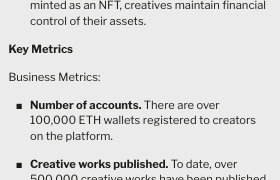
Summary
- Mirror is a decentralized publishing platform that enables creators to publish, own, and permanently store their creative works on chain.
- With an Ethereum log in, creators can mint all published posts online, enabling more control over their creative output than traditional platforms.
- Creators also benefit from new, more dynamic forms of audience engagement that allow supporters to publicly display their support for creators in their wallets—creating reputational benefits or “clout” for early support or participation in key creator events.
- Check out more examples of crypto in action.
Project Goals
Creators have struggled to monetize their intellectual property using existing social media platform models, in which platforms such as Twitter are able to monetize creators’ content and audience building through advertising. Mirror seeks to create a new and enhanced form of ownership for creatives that gives them more agency over their creative output and over the audiences they build.
While the emergence of Web2 platforms such as Substack have shown that individual creatives can develop audiences willing to pay for content, many of these services still limit creatives’ ability to transport their own content and social graph. Creators’ reputation—which often support their livelihoods—are often platform specific, with creators largely unable to bring their followers or reputations with them to new platforms. For example, creators often need to establish new follower counts, contributor scores, or other reputational indicators that signal to readers that they are worth following. Permanent storage of content is also not guaranteed. In contrast, by permanently documenting audiences and creative output on chain, Mirror seeks to empower creatives to transport their audiences and work across Web3 platforms independent of Mirror.
Implementation Strategy
Mirror is both a publishing platform and a platform for audience members to access the work of creatives they support. Mirror has prioritized the functionality of its publishing tools to build credibility with creatives, with a focus on long-form writing. Creators draft and publish work within the Mirror platform, then allow audience members to mint an NFT upon publishing. All written works are stored permanently via Arweave, a decentralized permanent data storage solution from which the Mirror protocol accesses and reads data (multimedia is hashed on IPFS). One time minting costs are supported by Mirror.
This structure enables creators to access and transfer their data independently of Mirror.

Mirror currently has 100,000 accounts tied to individual wallets that have published at least one entry on its platform, the majority of whom publish writing with a technical focus on the Web3 space. Creators can offer access to their work through the recently introduced subscription functionality, and can offer their content as limited edition NFTs minted on Mirror.
In addition to facilitating access to creative output, NFTs can serve as credentials that allow audience members to publicly display their support for creators in their wallets—creating reputational benefits or “clout” for early support or participation in key creator events.
This functionality allows audience members to “collect” works and display them in their wallets, creating more permanent indicators of support than on traditional Web2 platforms.
Mirror acknowledges that people new to Web3 may encounter more friction in its UX than seasoned Web3 product and service adopters. People must log in via an Ethereum wallet in order to publish or collect, though a wallet is not necessary to read content.
Initially, Mirror assessed a 2.5% fee on all transactions. It has paused all fees on new subscriptions and transactions to support adoption growth, and plans to reassess fee structures in the near future.
Mirror is also exploring transferring management of its protocol to a DAO structure in the future, in which a share of fees could be redistributed to creatives and audience members.
Industry Considerations
Adoption: Mirror and other self-publishing platforms are often difficult for readers and other audience members to access unless they are Web3 literate. Expanding audiences beyond early Web3 adopters may result in slower growth, creating potential pressure for fee-based models in the longer term.
Business Data
Status: Active – in-market
Technology: Ethereum
Location: New York, United States, and remote.
Constituency: Creators around the globe
Entity: Reflective Technologies, Inc.
Business model: Mirror plans to implement fees per minting.
Resources and References Website: https://mirror.xyz/
Additional references: Documentation.
This article originally appeared in the January 2023 Income and Wealth Creation in Web3 Report by the Crypto Research and Design Lab (CRADL) – a research organization committed to objectively documenting people, organizations, and activities in the crypto ecosystem and their impact on the broader industry.

























